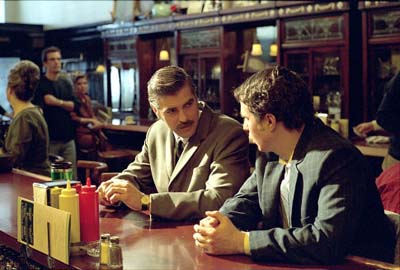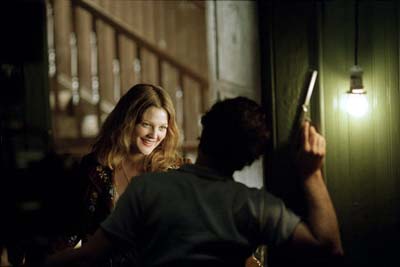Confessions of a Dangerous Mind
Thankfully not part four of the British 70's sex comedies.

For many, Chuck Barris is one of the unpraised geniuses of television. For an equal number of others, his trashy ideas signposted the demise of quality programming and his profile is that of a tat-merchant. For you and I (that's British folks, international readers), he's the reason Cilla Black assaults our eardrums with her scouse stylings every Saturday night on Blind Date. Yes, he's the mastermind behind American TV shows The Dating Game and The Gong Show among others, but what few people know is that he also made spurious claims in his memoirs as to his other profession; namely that he worked as a hitman for the C.I.A.
Whether or not you swallow that particularly dubious suggestion, Confessions of a Dangerous Mind represents a superb directorial debut for a certain Mr. George Clooney. Playing the role of Jim Byrd, C.I.A. Recruitment Officer, Clooney is the link between Barris' two purported lives, his appearance usually signaling a shift from a more traditional "downfall of a tortured genius" narrative to altogether more nefarious wet work at various locations around the globe.
The role of Barris himself falls to Sam Rockwell, an actor rapidly gaining credibility for his diversity in performances ranging from The Green Mile and Charlie's Angels, to more recent offerings such as Heist and Welcome to Collinwood. Portraying Barris in equal amounts of charm, vulnerability and downright stupidity, Rockwell pins his role down well, if not flawlessly, proving charismatic enough to carry much of the movie's weight on his own shoulders, albeit with admirable support from Drew Barrymore, Julia Roberts and Rutger Hauer, as well as Clooney.

Much of the movie focuses on Barris' rise to T.V. infamy, contrasting the success of his production company with his failure in his private life, underpinned by flashbacks of an oppressive childhood during which his mother raised him as a girl until the birth of his younger sister. How well this is chronicled I cannot be sure of, but these sections of the movie seem to be sincere in their portrayal of the young Barris, and I'm certainly willing to take much of what is mooted on faith. Where many will have difficulty in remaining focussed on the movie is in the assassination segments, where Barris uses his alleged government training to off a number of central European and Russian hoods. Barris' memoirs even go so far as to suggest that the reason behind offering holidays as a prize on The Dating Game was to afford him the opportunity to kill in the necessary country whilst operating as chaperone.
Fortunately for the audience, Clooney has the measure of the material, duly noting the slightly silly nature of Chuck's claims and treating these sections with the necessary pinch of salt. Many of the protagonists actions here are played for subtle laughs, giving light to an otherwise macabre subject matter whilst simultaneously suggesting we suspend our disbelief. Prime example of this is the inclusion of Barris' sometime partner-in-crime Keeler (Hauer), an aging hitman who likes to pose for pictures ("danke schon!") whilst strangling his victims. While Barris tries to build credibility in his claims by suggesting some of his more bizarre antics inspired ideas for gameshows, Clooney knowingly knocks them down a little by keeping the characterisation light in these sections and a little more weighty in the more lucid segments, suggesting perhaps we treat such claims lightly.
The cast are all superb, and while it may well be mostly Rockwell's show, his skills are not yet mature enough to succeed without good support. Hauer shows there's more to life than straight-to-video fair, and here at theOneliner we hope he has something of a career revival. Barrymore is extremely amiable as Barris' put-upon long term hippie girlfriend Penny, and even The Dreaded Roberts (I know, I know, I must stop this unfair lobbying) puts on a good show as European contact and part time lover Patricia.

It's evident from Clooney's experimentation with visual styles that he has learnt a lot from the various directors he's worked with, perhaps most notably his good friend Steven Soderbergh. The mixing of different film stocks between the main film and the occasional "talking heads" segments particularly reflects this, as does his measured focus on character and the evident laid-back style of his camera moves. Very little moves apace in this movie, Clooney instead content to let the characters command the majority of screen time rather than their actions. It certainly marks an impressive initial foray into directing for George, but only time will tell if he's the next Soderbergh or the next Joel Schumacher.
There's certainly a lot to enjoy here, from the performances to the direction and the sometimes offbeat subject matter, although the latter will obviously depend on your preference and ability to take a pinch of salt. Rockwell clearly has some way to go to cement his claim as leading man, but he certainly deserves fair praise for what is a largely successful attempt; if only he could convey a little more dramatic weight. Clooney too seems set for a rich career behind the camera as well as in front, assuming he can carry the momentum he's gathered here. Confessions of a Dangerous Mind is not the kind of film that's going to be everyone's cup of tea, but for those of us who prefer cinematic Darjeeling to a caffeine fuelled Grande Latte, this is very nearly a case of milk and two sugars.
Craig Disko has awarded Confessions of a Dangerous Mind 4 out of 5 Happy Baguettes.
Drew Barrymore (Penny)
George Clooney (Jim Byrd)